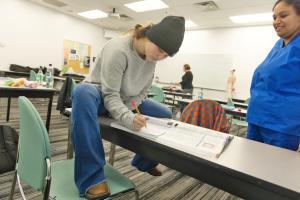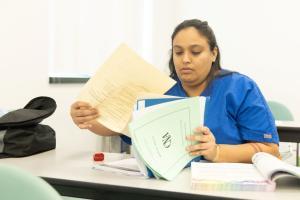Ready to Learn & Earn
“You won’t find many people saying that change is easy. But we are definitely in the business of making it easier,” says Patty Mendoza, director, adult education and literacy.

“We see the power of education at work, transforming lives and strengthening communities, and we want to help all residents to be able to access learning and complete what they start — from earning a GED® and learning English language skills to training for a workforce or health care career and earning a degree.”
Transitioning to college
To help students who want extra preparation and additional support focus on career training opportunities, LLCC is providing a class (8-10 weeks) alongside certain workforce and health care programs. “In our experience, all students — including those worried about the transition to college and those who have been out of school for a while — benefit from this class,” says Mendoza.
In the class, the college is meeting students where they are by reinforcing learning content and helping them build community, test-taking strategies, employability skills and more.
LLCC has provided these courses in diesel technologies and CNA, and is looking to expand these opportunities into areas such as automotive technology, hospitality and business.
Support in becoming a CNA
LLCC’s basic nurse assistant (CNA) certificate program can be completed in eight to 16 weeks. CNAs provide essential care for patients and get to work in interesting and varied settings. It is a common starting point for entering health professions. This spring, a support course is being offered alongside the certificate program.
“The course offers an opportunity to get material from your career training program shared in a different way. This helps fill gaps where students may not have understood something in class,” says Christy Cook-Webb, adult education and literacy navigator. “It’s also an opportunity to bring in the ‘why’ of learning — why it’s needed and tie the learning objectives to real life.”

“Students also can compare notes to improve their own note taking, learn skills for studying vocabulary and participate in mock interviews and other career readiness activities,” explains Kimberly Newcomb, adult education and literacy instructor.
“The support course is very helpful and motivates me,” shares Karen Anderson, CNA student at LLCC. “You’re in a group where you interact and exchange ideas. You build friendships, and it builds confidence. You know you’re not alone.”
Fellow CNA student Mike Schoenherr recommends the support course to other students. “If you’re coming out of the workforce and going back to school, it can be intimidating. This is a big help.”
“The course supports students and helps them succeed in the CNA class,” says Newcomb. “It’s very rewarding for students,” adds Cook-Webb. “You can see their excitement about the results they’re seeing.”
